titleii
Latest

Senators urge FCC to preserve neutrality protections for text messages
A group of Democratic senators led by Ed Markey of Massachusetts is urging the Federal Communications Commission (FCC) to keep text messages classified as a telecommunications service. Doing so would extend net neutrality protections to the messages, rather than give carriers the ability to block them based on content. The FCC will vote December 12th on a declaratory ruling that would classify SMS and MMS messages as information services.
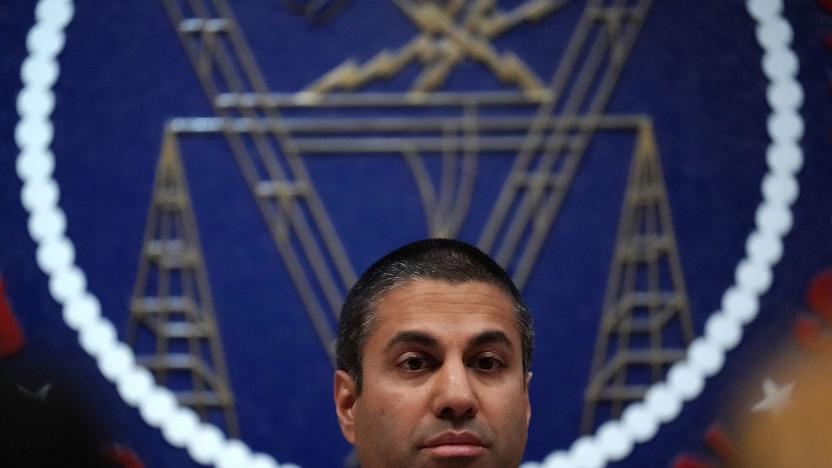
FCC releases the text of its order to undo net neutrality
A few weeks after the FCC voted to undo Title II protections for net neutrality, it has released the final text of its "Restoring Internet Freedom Order." That includes the contained arguments for why chairman Ajit Pai and two other commissioners believe the existing rules were harmful and absolutely must go, as well as dissenting opinions from commissioners Mignon Clyburn and Jessica Rosenworcel. Among the items addressed, it includes a note claiming that "identical or nearly-identical non-substantive comments that simply convey support or opposition" did not impact the commission If you've been paying attention to the debate then you'll be familiar with the various sides, but the 539-page document's release sets the stage for the next step: hearings, lawsuits, attempts by states and cities to establish their own rules, and attempts by Congress to firm up the rules in one way or another. Chairman Pai won't speak at CES next week, reportedly due to death threats, so if you'd like more information on why he pushed through such an unpopular decision, then for now this is the only way.

The FCC has repealed net neutrality
During today's open meeting, the FCC's proposal to repeal net neutrality protections put in place in 2015 was put to a vote and it passed, three votes to two. As was widely expected, the three Republican members -- Chairman Ajit Pai and Commissioners Michael O'Rielly and Brendan Carr -- voted in favor of the proposal while Commissioners Mignon Clyburn and Jessica Rosenworcel, both Democrats, voted against it.

Watch the FCC's net neutrality vote at 10:30AM ET
Today is the day that the internet as we know it could change dramatically. Starting at 10:30 AM Eastern, FCC chairman and former Verizon lawyer Ajit Pai is expected to wipe out net neutrality and repeal Title II regulations that classify broadband as a utility. And you can watch it happen at the link below. You might have to wait a bit before Pai almost assuredly enacts the Restoring Internet Freedom ruling, though. There are a few other items he has to get through before potentially enacting detrimental changes to how we access information and use the internet in general.
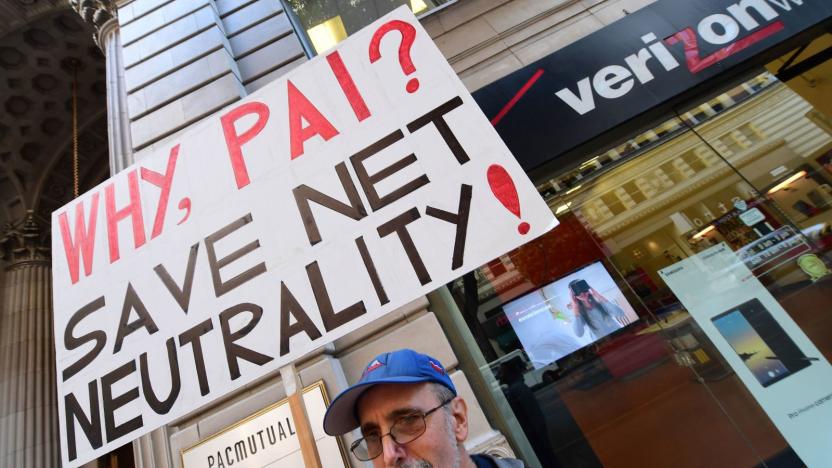
Net neutrality is a double-edged sword for small ISPs
"I have a love-hate relationship with Title II," Tyler Booth told Engadget. Booth is the president of Portland, Oregon-based ISP Stephouse Networks. His company serves more than 1,000 people in a 500 square-mile area, many who wouldn't have broadband access because Comcast often doesn't offer service in rural communities. DSL is available from CenturyLink, but many get unusable speeds because of their distance from the central office. For Booth, classifying broadband as a utility under Title II means he can compete with established providers and his customers get better service as a result. But it also means the government can dictate how he earns a living. "I'm, in principle, for net neutrality and everything it stands for. But when somebody creates regulations that have a direct impact on the costs and finances of my business, I don't really support that."
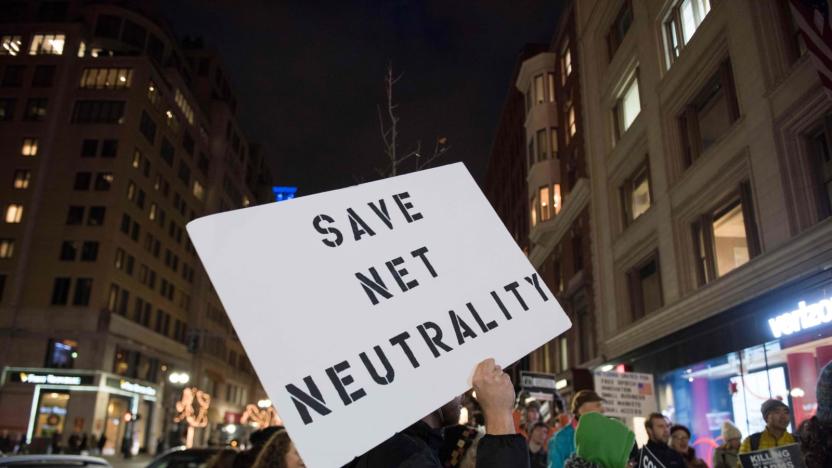
Destroying net neutrality will hurt artists and small businesses the most
The internet as we know it could change come December 14th. FCC chairman and former Verizon attorney Ajit Pai is expected to undo net neutrality, and with it the Title II regulations that prevent the likes of Comcast and Verizon from giving certain websites and services priority over others and moving their data faster. The worry is that repealing net neutrality will create an uneven playing field. For you and me, it could mean paying Verizon extra to access Netflix. But, for artists, small-business owners and musicians, it could lead to their work being disadvantaged, silenced or hidden behind a paywall. That type of barricade may stifle creativity and drive more cultural homogeneity. FM radio isn't a viable way to discover new music anymore because many stations have set playlists dictated by a few corporate overlords like iHeartRadio and Townsquare Media. Which is why the internet it is such a powerful tool for discovery. All someone needs is a cellphone and a YouTube account to get their name out there — not years of touring or approval from a panel of celebrity judges on America's Got Talent. It's that type of freedom many critics fear will vanish with Title II.
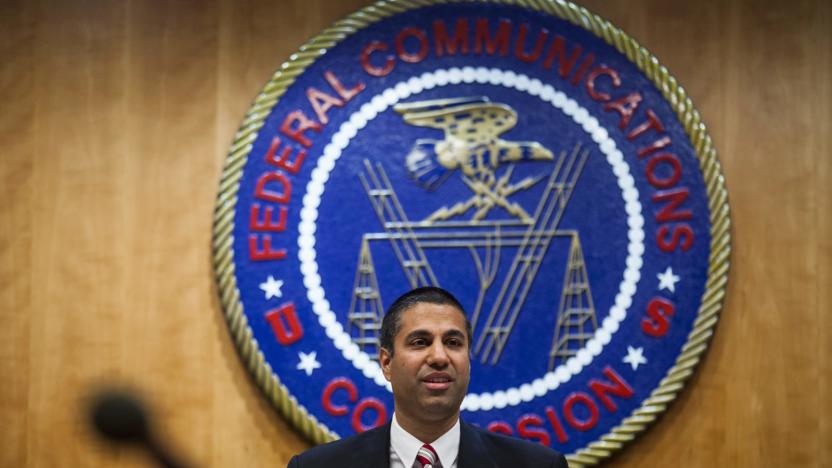
FCC releases the final draft of its proposal to kill net neutrality
The FCC has released the final draft of its proposal to roll back 2015 net neutrality protections. If enacted, the order would reclassify broadband internet service as an information service and Title II regulations would no longer apply. Additionally, blocking, throttling and fast-laning of content would no longer be banned and paid prioritization practices would be allowed as long as they're explicitly laid out by internet service providers. Further, any state-level regulations that contradict the FCC's order would be preempted.
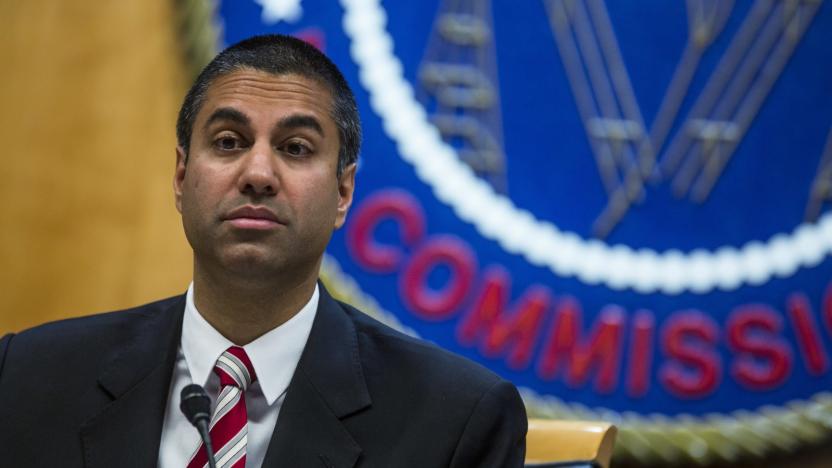
What to expect from the FCC's net neutrality proposal
Today, senior FCC officials outlined the net neutrality draft proposal that will be released by the commission tomorrow. As has been discussed for months, if the new proposal is accepted by the FCC, broadband internet service will cease being subjected to Title II regulations and will return to an information service classification rather than a telecommunications one. Additionally, the order would fully repeal the FCC regulations allowed by the internet conduct standard put in place in 2015, which let the commission investigate practices like zero-rating schemes -- AT&T's Sponsored Data and Verizon's FreeBee Data 360 setups, for example -- and would get rid of the bright-line rules that prevented internet service providers (ISP) from blocking, throttling or fast-laning certain content.

The FCC's plan to undo net neutrality is about to be revealed
Back in April, new FCC chairman Ajit Pai outlined a plan to undo net neutrality protections implemented during the Obama administration, before taking public comments. Millions of messages in response crashed the FCC's website for a time, but despite opposition, he is reportedly ready to move forward and may unveil more details this week. The Wall Street Journal, New York Times and Politico separately reported that we will find out details later on Tuesday, before the commission votes on them in December.

Comcast tells the FCC that net neutrality should be voluntary
Last week, thousands of companies and organizations stood up for net neutrality during the Day of Action and as the first round of comments on the FCC's plan to severely cut back protective regulations wraps up, over 8.4 million comments have been filed. Comcast added its comments today and posted its stance online. In sum, it supports the FCC's proposed deregulations but specifically the removal of Title II classifications. Comcast claims it will still support the open internet regardless of the decision but maintains that Title II hurts innovation.

The internet needs us to save net neutrality
Today, thousands of websites and organizations are showing their support for net neutrality in hopes of preserving the open internet. Consider Engadget among them. The Federal Communication Commission, as chaired by former Verizon lawyer Ajit Pai, is exploring ways to repeal the open internet rules put into effect by former chairman Tom Wheeler, and that's just not OK.

The FCC chairman thinks it's still 1996
FCC chairman Ajit Pai sounds like a broken record. "Light-touch framework." "Light-touch approach." "Light-touch regulation." As an ideological concept, it seems reasonable. Especially to a conservative such as Pai, who believes that the government shouldn't "pick winners and losers," to use a favorite phrase of Republicans. Except, when you actually look closely at the chairman's argument about how to regulate internet service providers, it collapses under its own misguided logic.
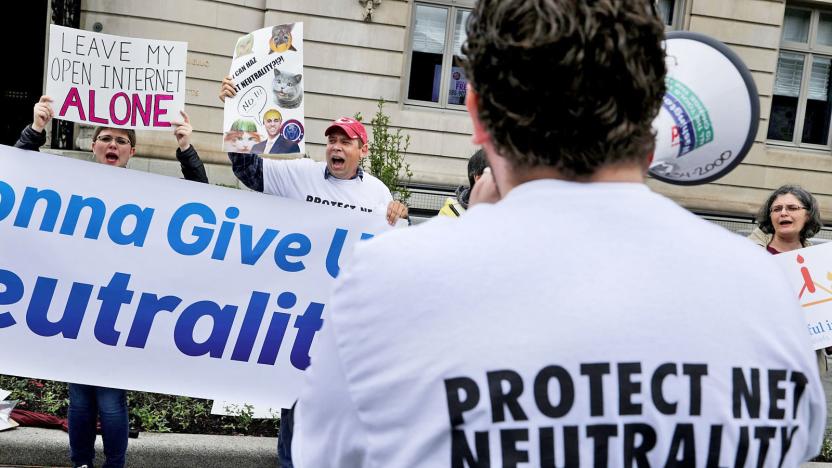
The FCC votes to move forward with gutting net neutrality
Today, during an open commission meeting, the FCC voted to move forward with its plans to undo many rules enacted under the Obama administration meant to protect the principle of net neutrality. The most important part of this proposed rollback is changing broadband internet from being classified as a Title II service back to a Title I service. Title I has fewer rules regarding how traffic over the network is treated. Under Title II internet is regulated like a utility and requires that all data across the network be treated equally so long as it doesn't violate any laws. Under Title I however, ISPs are free to prioritize data as they see fit and even charge more to guarantee better service. This is of growing concern as the line between service providers and content providers continues to blur.

Judge says AT&T can't stop FTC lawsuit over data throttling
AT&T's attempt to turn the tables on the Federal Trade Commission's mobile data throttling lawsuit hasn't exactly worked out as planned. A federal judge has rejected the carrier's claims that it can't be sued because its status as a common carrier for voice, which exempts it from FTC oversight, also applies to data. This exception only applies to the services that they're meant to cover, according to the court -- while the Federal Communications Commission's upcoming net neutrality rules will factor in mobile data, they aren't in effect right now. The judge also says AT&T misrepresented the whole point of the rule. It's intended to prevent overlap between common carrier regulations, not (as the network suggested) regulations as a whole. In short, AT&T will have to deal with the consequences of limiting its unlimited data customers, whether that's a slap on the wrist or a serious change in policy. [Image credit: AP Photo/Mark Lennihan]

ISPs are suing the FCC to fight new net neutrality rules
As anticipated, now that the new net neutrality rules are here lawsuits have closely followed. The Washington Post reports that industry group USTelecom -- which counts Verizon and AT&T execs among its board members -- filed suit in Washington, while small ISP Alamo Broadband (its website is powered by Wordpress) is suing in New Orleans. USTelecom has opposed the Title II powers invoked by the FCC's new rules, and isn't waiting until they're published in the Federal Register before suing. A Verizon lawsuit knocked down the FCC's previous net neutrality protections, and this next round is only just getting started. [Image credit: AP Images for Avaaz]

The net neutrality war of words wages on
While you may have been doing a victory lap around your cubicle in the last few hours, not everyone is so enthused about the FCC's decision today. The commission voted to officially classify broadband internet as a Title II public utility, and it's already prepared for lawsuits from service providers. While court proceedings will take time to hash out, a war of words wages on in the immediate aftermath, so we've compiled comments from both sides on the matter.

Sprint breaks ranks with other ISPs on net neutrality
Sure, AT&T and Verizon claim that if the FCC increases regulation of internet service to enforce net neutrality then they'd have reason to slow down investing in new upgrades, but Sprint is saying something different. GigaOm points out a letter to the FCC from Sprint (PDF) saying that it doesn't think the application of Title II classification under the Communications act (treating internet like a utility, like phone service) will cause any problems. Stephen Bye, Sprint's Chief Technology Officer writes that "Sprint will continue to invest in data networks regardless of whether they are regulated by Title II, Section 706, or some other light touch regulatory regime" -- supporting what most net neutrality advocates, including the President, are pushing for.

The GOP version of net neutrality leaves out Title II
While the FCC gets ready to vote on its new plan for net neutrality next month, a couple of Republicans in Congress are already showing off their own plan. Senator Jon Thune (R, SD) and Representative Fred Upton (R, MI) published an op-ed today outlining a proposal that they claim protects internet users while also spurring job creation and economic growth. They have 11 principles it should follow which include blocking, throttling and any kind of paid prioritization, however it differs from the approach backed by President Obama (surprise!) by classifying internet access as an information service under the Communications Act. It also mentions blocking the FCC from using Title II as a way to increase regulation over internet services by treating them as a utility, which some believe FCC Chairman Tom Wheeler will try to do at the vote next month.

FCC plans to vote on new net neutrality rules in February
Clear your calendars, defenders of the internet: The next big development in the net neutrality battle is due in February. First reported by the Washington Post, the FCC has confirmed it plans to vote on new rules next month. The rumors indicate a draft proposal will go around first with a vote planned for a couple of weeks later, but there's no word yet on whether the ever-controversial "fast lanes" will be included, or if the FCC will reclassify internet services under Title II. The President has weighed in with his opinion, along with thousands of internet comments -- we'll find out more about how those balance against the interests and threats of the big telecommunications companies next month. [Image credit: BRENDAN SMIALOWSKI/AFP/Getty Images]

Google to FCC: if the internet is a Title II utility, let us expand Fiber
Verizon famously said that if the FCC heeds President Obama's urging and declares the internet a Title II utility, it would cause "great harm to an open Internet, competition and innovation." But exactly the opposite of that may happen, according to a letter from Google to the FCC. Mountain View pointed out that if broadband internet access is declared to be a Title II service, then Google Fiber should be granted the same access as other utilities to poles and other essential infrastructure. It went on to say that doing so would actually "promote broadband deployment and competition."








